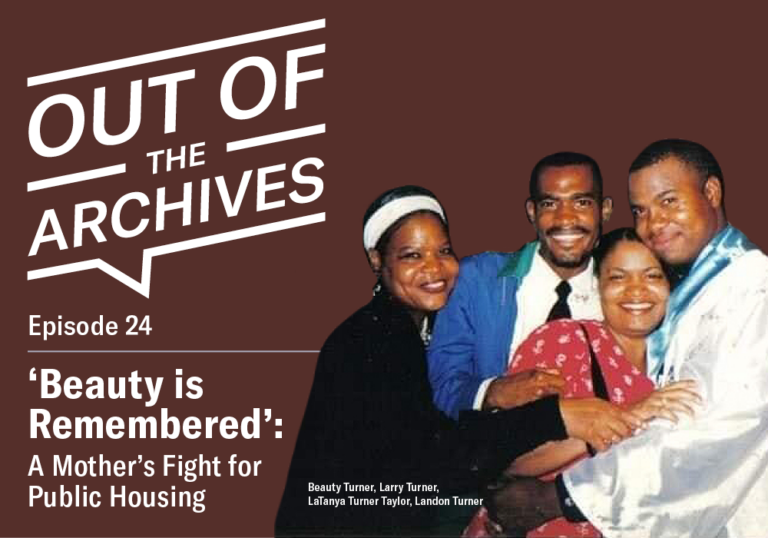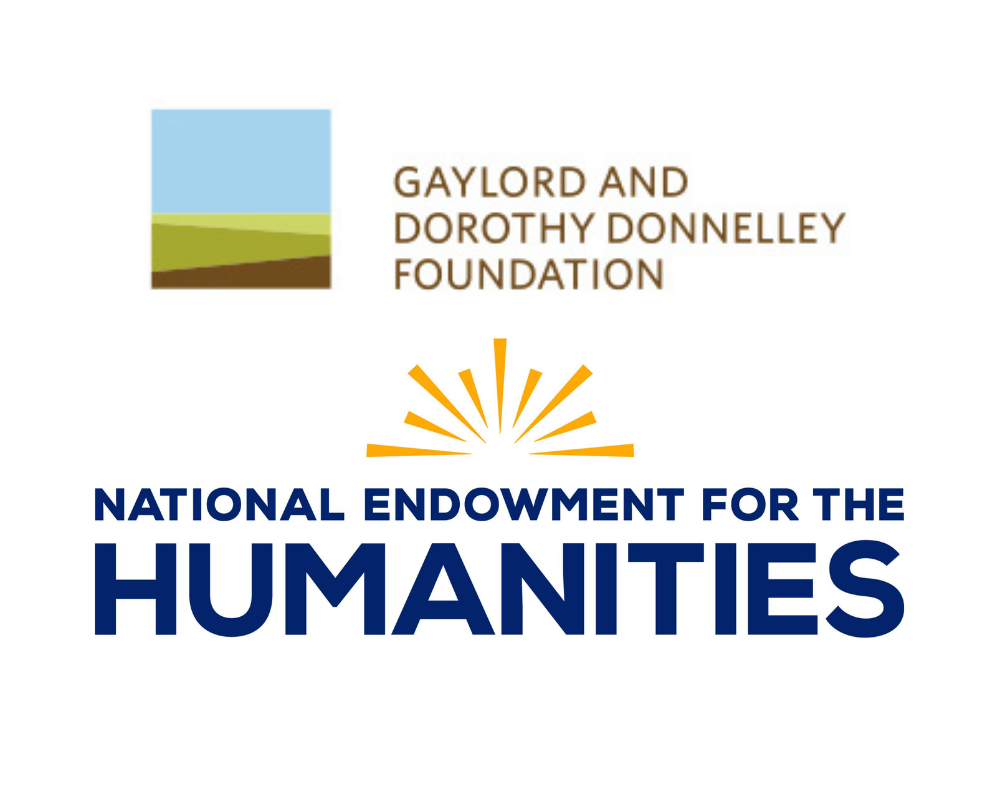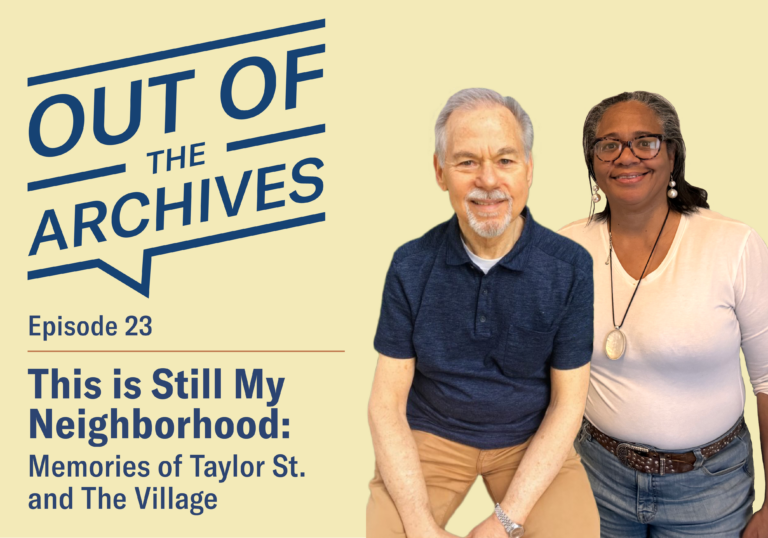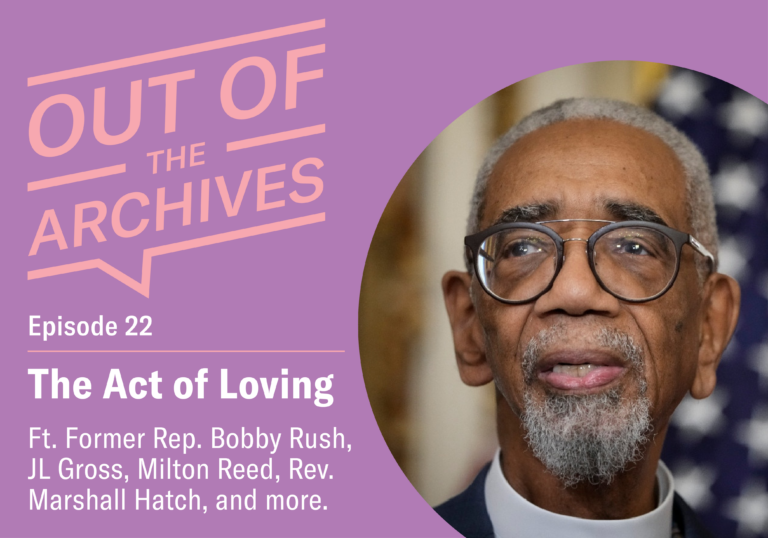

Out of the Archives
Podcast
Out of the Archives (OOTA) is the National Public Housing Museum’s oral history-based podcast, centering the voices and experiences of current and former public housing residents from across the country. The podcast began in 2020 as a way to publicly share stories from our Oral History Archive, highlighting themes related to the Museum’s mission to preserve, promote, and propel the right of all people to a place to call home.
The museum has begun sharing our full access interviews through the Public Oral History Archive. Episode descriptions include links to the featured narrators’ full-length interviews that are currently publicly available. We will continue updating descriptions as more interviews are added!
Featured Podcast Episodes
About this Season
In season 4, you will hear episodes #23 – 26, our first foray into writing and editing the podcast with a seasonal format in mind.
Season 4 engages public housing residents’ conversations about equity and displacement, blending these insights with reflections on their hopes and dreams for public housing communities and lands. This season, the curatorial team is also experimenting with sound design to give listeners a more intimate encounter with residents’ memories and the history.
—
Museum staff has experimented with different curatorial approaches for Out of the Archives over the years. Season 1 focuses its curation around unique themes, such as sports or entrepreneurship practices in public housing, whereas season 2 uses a more free-form approach that lets the stories speak for themselves. Season 3’s practice mixes the two methods and also remixes select episodes with more historical context through staff narration. Season 4 engages public housing residents’ conversations about equity and displacement, blending these insights with reflections on their hopes and dreams for public housing communities and lands. This season, the curatorial team is also experimenting with sound design to give listeners a more intimate encounter with residents’ memories and the history.
Out of the Archives is written and produced by the National Public Housing Museum and mixed and mastered by Seth Engel. Our theme song, “Born in the Blues,” was written, performed, and recorded the late Keith Hudson, a former Stateway Gardens resident. The logo was designed by Andy Hendricks.
This work is licensed under a Creative Commons Attribution-NonCommercial-NoDerivatives 4.0 International License.

Follow the navigation bar above to explore more episodes, or stream them on
 Spotify or
Spotify or  Apple Podcasts.
Apple Podcasts.
Episode 24 Details
Who are the heroes of your neighborhood? In our latest episode of Out of the Archives, “Beauty is Remembered: A Mother’s Fight for Public Housing,” we honor the legacy of Ms. Beauty Turner, a mother, journalist, historian, and community activist who lived in Chicago’s Robert Taylor Homes for over a decade. Listen to Larry Turner, the eldest son of Ms. Beauty, other former Robert Taylor residents, and even Ms. Beauty herself discuss the community’s rich and complex history. Their reflections underscore why neighborhood heroes like Ms. Beauty are critical to every community.
Content Notes: This episode discusses themes of death/dying, drug use, state-sanctioned displacement, and houselessness. Please take care while listening.
Narrators: Larry Turner, Troy Gaston, Patricia Porter, Betty Thompson, Richard Morgan. Excerpts of Ms. Beauty Turner are from Dislocation (Sundhir Venkatesh, 2005) and Interrupt the Pipeline (Flavian Prince and Daniel Rudin, 2009).
Larry and Troy’s interviews are also curated in episode 22 and episode 16 respectively.
Episode 23 Details
Narrators Janetta Pegues and Allen Schwartz, in conversation with oral historian Liú Chen, share stories of living in the Jane Addams Homes, intimately known as “The Village”, during the 1940s–1980s. Janetta and Allen share insights about the neighborhood’s different periods of redevelopment and change, including the construction and development of University of Illinois Chicago in the 1960s and the ongoing gentrification of Little Italy.
Listen to Allen and Janetta’s FULL joint conversation here.
A teaser installation was also curated from this joint conversation for our Taylor Street Window Installations.
Narrators: Janetta Pegues and Allen Schwartz
About this Season
In season 3, you will hear episodes #19–22, and expanded “redux” episodes #2, 5, and 12.
Season 3’s curatorial approach puts interview excerpts together that related to a certain theme and contextualize them with additional historical background information.
—
Museum staff has experimented with different curatorial approaches for Out of the Archives over the years. Season 1 focuses its curation around unique themes, such as sports or entrepreneurship practices in public housing, whereas season 2 uses a more free-form approach that lets the stories speak for themselves. Season 3’s practice mixes the two methods and also remixes select episodes with more historical context through staff narration. Season 4 engages public housing residents’ conversations about equity and displacement, blending these insights with reflections on their hopes and dreams for public housing communities and lands. This season, the curatorial team is also experimenting with sound design to give listeners a more intimate encounter with residents’ memories and the history.
Out of the Archives is written and produced by the National Public Housing Museum and mixed and mastered by Seth Engel. Our theme song, “Born in the Blues,” was written, performed, and recorded the late Keith Hudson, a former Stateway Gardens resident. The logo was designed by Andy Hendricks.
This work is licensed under a Creative Commons Attribution-NonCommercial-NoDerivatives 4.0 International License.

Follow the navigation bar above to explore more episodes, or stream them on
 Spotify or
Spotify or  Apple Podcasts.
Apple Podcasts.
Episode 19 Details
In this episode of Out of the Archives, “It’s Certain Things That I Think Are Human Rights,” we celebrate National Fair Housing Month by tracing the origins of the commemorative month and digging into the concept of ‘housing is a human right’ with an array of current and former residents from Chicago public housing.
Narrators: Dr. Richard Morgan, Juanita Stevenson, Allen Schwartz, Nakia Herron, and Reverend Marshall Hatch.
Episode 20 Details
In this episode of Out of the Archives, “Everybody Needs Somebody to Love,” we celebrate a resident from the ABLA (a group of public housing projects consisting of the Jane Addams Homes, Robert Brooks Homes, Loomis Courts, and Grace Abbott Homes) community, the late Mr. Wilbur Farley. If that name sounds familiar, perhaps it is because he has appeared many times in different ABLA oral histories we have gathered. Known as “Mr. Fix-It” for his ingenuity and helping neighbors with small repairs, Mr. Farley was such a hugely influential and important member of the community that “Mr. Farley Day Back to School Celebration and Party” (as it was originally called) was created in 1984 by the ABLA community.
Narrators: Godfrey Bey, Al Buford, Byron Dickens, and Marquita Gandy.
Episode 21 Details
In this episode, “There’s So Much Magic in a Place,” we uplift a range of experiences of public housing residents from across the country, featuring narrators from New York City, Milwaukee, Cleveland, and Chicago. These narrators share stories of how their relationships to home and place have shaped, and have been shaped by, their identities as individuals and communities.
Narrators: Ramona Ferreyra, Danté Hamilton, Connie Lindsey, and Willie McShan.
Episode 22 Details
When considering what “love” is, many varieties come to mind. Romantic love and platonic love dominate our TV shows, movies, and music, but these are only two pieces of the picture. What about love of a place, love of a people, or love of a purpose and principles? This episode, “The Act of Loving,” shares stories of all sorts of love in public housing, expanding our definition of what love means.
Narrators: J.L. Gross, Reverend Marshall Hatch, Milton Reed, Former Representative Bobby Rush, Daphany Rose Sanchez, Larry Turner, and Tanisha Wright.
Episode 12 (Redux) Details
In this episode of Out of the Archives, we’re revisiting Episode 12, “Full of Life,” and have added more historical context behind the stories narrators share! This episode feature stories about finding yourself through the arts and recreation, reclaiming and growing after trauma, and more.
Narrators: Marquita Gandy, Nakia Herron, Olga Molina, Sokeo Ros, and Henry Warfield.
Episode 2 (Redux) Details
“Bringing the Outdoors In: Community and Recreation in Public Housing”, originally aired on April 30, 2020, shortly after the start of the COVID-19 pandemic lockdown. Needless to say, this period required the world to drastically reimagine how we interact while also keeping our neighbors and broader communities safe. Thinking back to those first few weeks of the pandemic, one of the most immediate and disarming changes was not being able to commune with our friends, family, classmates, and colleagues. We shared this episode with that mentality in mind, hoping to bring listeners closer to what was familiar to them. Now, over three years later, we are still living with the ever-rippling effects of the pandemic. But through those ripples we’ve also shown how adaptable we can be, finding creative ways to convene, play, and find joy with our communities.
Narrators: Betty Howard, Tommy Woods, Phil Ayala, Janetta Pegues, and Sunny Fischer.
Episode 5 (Redux) Details
Experience the thrill of late-night basketball games, memories from an Olympic-level boxer, and more about the power of sports. Storytellers for this episode include Lee Roy Murphy, Olympic boxer of the Robert Taylor Homes; Gil Walker, the former director of programs of the Chicago Housing Authority; Tanisha Wright, former WNBA player of Mon View Heights, and more.
Narrators: Lee Roy Murphy, James Purgatorio, Gil Walker, Tanisha Wright, Tommy Woods, and Byron Dickens.
About this Season
In season 2, you will hear episodes #13–14, 16, and 18.
Season 2 uses a more free-form approach that lets the stories speak for themselves.
—
Museum staff has experimented with different curatorial approaches for Out of the Archives over the years. Season 1 focuses its curation around unique themes, such as sports or entrepreneurship practices in public housing, whereas season 2 uses a more free-form approach that lets the stories speak for themselves. Season 3’s practice mixes the two methods and also remixes select episodes with more historical context through staff narration. Season 4 engages public housing residents’ conversations about equity and displacement, blending these insights with reflections on their hopes and dreams for public housing communities and lands. This season, the curatorial team is also experimenting with sound design to give listeners a more intimate encounter with residents’ memories and the history.
Out of the Archives is written and produced by the National Public Housing Museum and mixed and mastered by Seth Engel. Our theme song, “Born in the Blues,” was written, performed, and recorded the late Keith Hudson, a former Stateway Gardens resident. The logo was designed by Andy Hendricks.
This work is licensed under a Creative Commons Attribution-NonCommercial-NoDerivatives 4.0 International License.

Follow the navigation bar above to explore more episodes, or stream them on
 Spotify or
Spotify or  Apple Podcasts.
Apple Podcasts.
Episode 13 Details
In this episode, “Hidden History America,” storytellers analyze the state of public housing in New York City, moving out of public housing into Chicago’s Lakeview neighborhood, and the tireless efforts of parents working nights to give their children a better life.
Narrators: Daphany Rose Sanchez, Robert Scott, Blanche Winston, Daniel Nicholson, Roger Prosise, and Charlene-Finley Purnell
Episode 14 Details
In this episode, “Mind to Grow,” residents share their unapologetic love for their homes, memories of childhood summer fun, and the strength within the community.
Narrators: Carrie Torres, Doris Johnson, Mike Johnson, Janet Williams, Nakia Herron, and Gregory Sain.
Episode 16 Details
In this episode, “Our Neighbors Stepped Up,” narrators from Chicago, Cleveland, New York City, Minneapolis, and South Bend share stories about fun competitions between neighbors during the holidays, the stress of public housing waiting lists, and the importance of community centers for youth development.
Narrators: Ladan Yusef, Lynn Adell Bowens, Troy Gaston, Cliff Christian, Jillian Stewart, and Edmund “Dante” Hamilton.
Episode 18 Details
In this episode, “Pressure and Time Makes Diamonds,” we celebrate Black History Month with a rangle of narrators sharing a range of their complex experiences as Black residents of New York City public housing.
Narrators: Bonnie Bryant, Domingo Morales, Pam Phillips, and Jayah Arnett.
About this Season
In season 1, you will hear episodes #1-12, 15, and 17.
Season 1 focuses its curation around unique themes, such as sports or entrepreneurship practices in public housing.
—
Museum staff has experimented with different curatorial approaches for Out of the Archives over the years. Season 1 focuses its curation around unique themes, such as sports or entrepreneurship practices in public housing, whereas season 2 uses a more free-form approach that lets the stories speak for themselves. Season 3’s practice mixes the two methods and also remixes select episodes with more historical context through staff narration. Season 4 engages public housing residents’ conversations about equity and displacement, blending these insights with reflections on their hopes and dreams for public housing communities and lands. This season, the curatorial team is also experimenting with sound design to give listeners a more intimate encounter with residents’ memories and the history.
Out of the Archives is written and produced by the National Public Housing Museum and mixed and mastered by Seth Engel. Our theme song, “Born in the Blues,” was written, performed, and recorded the late Keith Hudson, a former Stateway Gardens resident. The logo was designed by Andy Hendricks.
This work is licensed under a Creative Commons Attribution-NonCommercial-NoDerivatives 4.0 International License.

Follow the navigation bar above to explore more episodes, or stream them on
 Spotify or
Spotify or  Apple Podcasts.
Apple Podcasts.
Episode 1 Details
In this episode, “Surviving and Thriving in Public Housing,” narrators share stories of innovative entrepreneurship found in public housing complexes across Chicago. Narrators recall buying candy from trucks outside of the Cabrini-Green Homes, a watermelon man from the ABLA community, and an artist named Milton Reed, known as the Diego Rivera of the projects, who used his talent to beautify his community.
Narrators: Harold Brown, Liz Thompson, Milton Reed, Godfrey Bey, and Chalonda McIntosh
Episode 2 Details
This episode was revisited and expanded in Season 3.
In this episode, “Bringing the Outdoors In,” narrators shares stories of community and compassion found in public housing. Storytellers recall the playgrounds found in New York City public housing, having neighbors feel like family, and gaining respect through sports, as well as through fighting.
Narrators: Betty Howard, Tommy Woods, Phil Ayala, Janetta Pegues, Sunny Fischer, and LeeRoy Murphy
Episode 3 Details
This episode, “Ordinary But Extraordinary” takes cues from our 2018 exhibition History Lessons: Everyday Objects from Chicago Public Housing, and looks to show the importance of everyday stories and their ability to deepen our understanding of American history.
Narrators: Raymond “Shaq” McDonald, Claudice Ware, H. Demetrius Bonner, Juanita Stevenson, Crystal Tininia Palmer-White, and Allen Schwartz.
Episode 4 Details
In this episode, “Black is Beautiful: Reflections on Arts, Culture, and Activism,” current and former public housing residents share a range of stories that exemplify not only that Black Lives Matter, but are creative, full of joy, courageous, and essential.
Narrators: Raymond “Shaq” McDonald, Francine Washington, Mary Baggett, Bruce Wilkerson, Fred Cash, Sequane Lawrence, and Congressman Bobby L. Rush.
Episode 5 Details
This episode was revisited and expanded in Season 3.
In this episode, “Play Ball: Sports and Athletics in Public Housing,” former public housing residents and housing authority workers, share a range of stories about how late-night games of basketball would make a positive impact on communities and how diligent practicing could be life-changing.
Narrators: LeeRoy Murphy, Gil Walker, James Purgatorio, and Tanisha Wright.
Episode 6 Details
In this episode, “Taking Care of Us: Community Care in Public Housing,” the Museum’s summer 2020 interns from Roosevelt University made selections from their favorite parts of the museum’s oral history collection, which collectively discuss the ways our communities shape us. The intern team included Skye Darke, Victoria Limon, River Toomer, and James Wilson.
Narrators: JonTia Pegues, Domenica Abbott, Phron Freeman, and Kimberly Wellington.
Episode 7 Details
In this episode, “A Change of Season: Resident Adaption and Resilience” looks at the changing of the Little Italy neighborhood over the years, finding housing in a big city, resident dance parties, and more.
Narrators: Ida Brantley, Ned Lufrano, Alderman Walter Burnett, Jr., and Liz Torres.
Episode 8 Details
In this episode of Out of the Archives, “We’re Connected to Everybody: Connecting Stories, Connecting Dots,” narrators share stories of quarter parties that were organized in the Henry Horner Homes to help residents pay for their rent, finding the good in a community when you’re in a difficult time, and a family’s first television set at the Lathrop Homes.
Narrators: Harold Brown, Sunny Fischer, Dr. Cranston Sedrick Knight, John Pettiford, and Trudy Mendoza.
Episode 9 Details
In this episode, “Close to Home: Reflections on the Animal Court,” we celebrate the end of 2020, we share a selection of stories that are central to old fixture of the Museum’s home in Chicago’s Little Italy neighborhood: the Edgar Miller Animal Court. You’ll hear from residents as they share stories reminiscing on the animal sculptures designed and created by Edgar Miller during the 1930s, reflecting on it as a meeting ground and landmark for generations of ABLA residents.
Check out the restored animal sculptures when you visit the National Public Housing Museum in Chicago!
Narrators: JonTia Pegues, Marquita Gandy, Gloria White, Byron Dickens, James Purgatorio, Phron Freeman, and Duane D. Crockett.
Episode 10 Details
In this episode of Out of the Archives, “Black is Beautiful Two: Reflections on Family, Activism, and Perseverance” we celebrate Black History Month by continuing the narrative from our June 2020 episode by the same name, which highlights stories from the Black community. You’ll hear about one storyteller’s development as a community organizer, finding strength in family in the face of difficulties, and more.
Narrators: Coll ette Payne, H. Demetrius Bonner, Willie “J.R.” Fleming, DaVida Rowley-Blackman, Delores Van Pelt, and Michael Miles
Episode 11 Details
In this episode, “Silent Voices Among Us: Stories from Chicago’s Henry Horner Homes,” we share stories from residents of the Henry Horner Homes, known to many of its residents as the Hornets. The stories range from different experiences in the early years to moving out during demolition.
Check out our online exhibition of the same name, with photographs by Dr. Cranston Knight.
Narrators: Crystal Palmer, Marina Pullom, Patricia Smith, John Pettiford, Sharon Leggitt, and Maria Moon.
Episode 12 Details
This episode was revisited and expanded in Season 3.
In this episode, “Full of Life: Learning and Personal Growth,” we feature stories about finding yourself through the arts and recreation, reclaiming and growing after trauma, and more.
Narrators: Ben Baker, Henry Warfield, Sokeo Ros, Marquita Gandy, Nakia Herron, and Olga Molina.
Episode 15 Details
This episode, “Candyman was a Candyman: People of Cabrini Green,” was co-curated by the Chicago History Museum and is set in Chicago’s Cabrini-Green community. Narrators from the community share their experiences of life in Cabrini Green, with stories including residents’ creative aspirations, an uneasy gang truce after the murder of 7-year old Dantrell Davis, the ins and outs of socializing in school, as well as insight to who the infamous Candyman really was.
Narrators: Raymond “Shaq” McDonald, Katherine Davis, Betty Howard, Alderman Walter Burnett Jr., Roger Prosise, Tenika Chew, Willie “J.R.” Fleming, and Delores Van Pelt.
Episode 17 Details
In this episode, “My Heart Was in It: Holidays in Public Housing,” narrators share a range of stories about their memories of the end of year holidays in the projects. You’ll hear about hallway decoration competitions in New York City Public Housing, special gifts, and a family’s decision to donate to those who have less.
Narrators: Lynn Adell Bowens, Katherine Davis, Sunny Fischer, Ida Brantley, Kimberly Wellington, Diane Rizzi, Carol Rizzi, Deonte Black, and Brenda Taylor.
Sponsors
The Oral History Programs are generously supported by the Gaylord & Dorothy Donnelley Foundation and the National Endowment for the Humanities.
Contact Us
Please email NPHM Oral History Programs Manager, Liú Chen, with any questions, concerns, or if you’re interested in getting involved.



